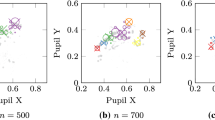Abstract
In stream data mining, stream clustering algorithms provide summaries of the relevant data objects that arrived in the stream. The model size of the clustering, i.e. the granularity, is usually determined by the speed (data per time) of the data stream. For varying streams, e.g. daytime or seasonal changes in the amount of data, most algorithms have to heavily restrict their model size such that they can handle the minimal time allowance. Recently the first anytime stream clustering algorithm has been proposed that flexibly uses all available time and dynamically adapts its model size. However, the method exhibits several drawbacks, as no noise detection is performed, since every point is treated equally, and new concepts can only emerge within existing ones. In this paper we propose the LiarTree algorithm, which is capable of anytime clustering and at the same time robust against noise and novelty to deal with arbitrary data streams.
Access this chapter
Tax calculation will be finalised at checkout
Purchases are for personal use only
Preview
Unable to display preview. Download preview PDF.
Similar content being viewed by others
References
Aggarwal, C.C., Han, J., Wang, J., Yu, P.S.: A framework for clustering evolving data streams. In: VLDB, pp. 81–92 (2003)
Bowers, N.L., Gerber, H.U., Hickman, J.C., Jones, D.A., Nesbitt, C.J.: Actuarial Mathematics. Society of Actuaries, Itasca (1997)
Kranen, P., Assent, I., Baldauf, C., Seidl, T.: Self-adaptive anytime stream clustering. In: IEEE ICDM, pp. 249–258 (2009)
Author information
Authors and Affiliations
Editor information
Editors and Affiliations
Rights and permissions
Copyright information
© 2011 Springer-Verlag Berlin Heidelberg
About this paper
Cite this paper
Kranen, P., Reidl, F., Sanchez Villaamil, F., Seidl, T. (2011). Hierarchical Clustering for Real-Time Stream Data with Noise. In: Bayard Cushing, J., French, J., Bowers, S. (eds) Scientific and Statistical Database Management. SSDBM 2011. Lecture Notes in Computer Science, vol 6809. Springer, Berlin, Heidelberg. https://doi.org/10.1007/978-3-642-22351-8_25
Download citation
DOI: https://doi.org/10.1007/978-3-642-22351-8_25
Publisher Name: Springer, Berlin, Heidelberg
Print ISBN: 978-3-642-22350-1
Online ISBN: 978-3-642-22351-8
eBook Packages: Computer ScienceComputer Science (R0)




